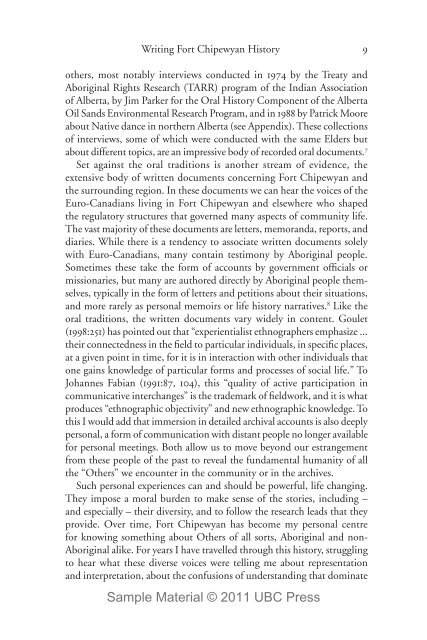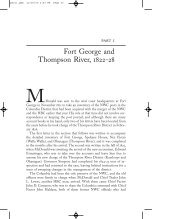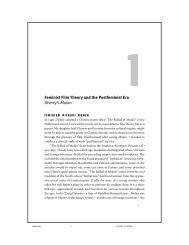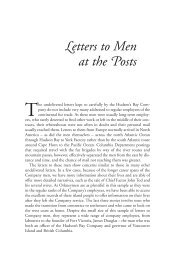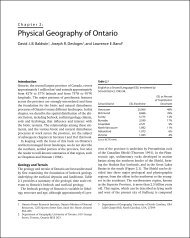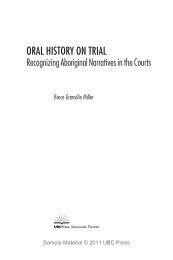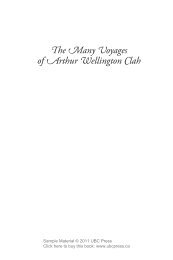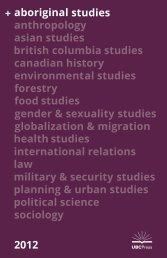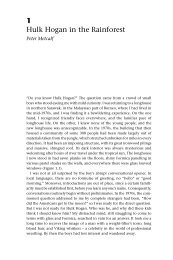Fort Chipewyan and the Shaping of Canadian History ... - UBC Press
Fort Chipewyan and the Shaping of Canadian History ... - UBC Press
Fort Chipewyan and the Shaping of Canadian History ... - UBC Press
You also want an ePaper? Increase the reach of your titles
YUMPU automatically turns print PDFs into web optimized ePapers that Google loves.
Writing <strong>Fort</strong> <strong>Chipewyan</strong> <strong>History</strong><br />
o<strong>the</strong>rs, most notably interviews conducted in 1974 by <strong>the</strong> Treaty <strong>and</strong><br />
Aboriginal Rights Research (TARR) program <strong>of</strong> <strong>the</strong> Indian Association<br />
<strong>of</strong> Alberta, by Jim Parker for <strong>the</strong> Oral <strong>History</strong> Component <strong>of</strong> <strong>the</strong> Alberta<br />
Oil S<strong>and</strong>s Environmental Research Program, <strong>and</strong> in 1988 by Patrick Moore<br />
about Native dance in nor<strong>the</strong>rn Alberta (see Appendix). These collections<br />
<strong>of</strong> interviews, some <strong>of</strong> which were conducted with <strong>the</strong> same Elders but<br />
about different topics, are an impressive body <strong>of</strong> recorded oral documents. 7<br />
Set against <strong>the</strong> oral traditions is ano<strong>the</strong>r stream <strong>of</strong> evidence, <strong>the</strong><br />
extensive body <strong>of</strong> written documents concerning <strong>Fort</strong> <strong>Chipewyan</strong> <strong>and</strong><br />
<strong>the</strong> surrounding region. In <strong>the</strong>se documents we can hear <strong>the</strong> voices <strong>of</strong> <strong>the</strong><br />
Euro-<strong>Canadian</strong>s living in <strong>Fort</strong> <strong>Chipewyan</strong> <strong>and</strong> elsewhere who shaped<br />
<strong>the</strong> regulatory structures that governed many aspects <strong>of</strong> community life.<br />
The vast majority <strong>of</strong> <strong>the</strong>se documents are letters, memor<strong>and</strong>a, reports, <strong>and</strong><br />
diaries. While <strong>the</strong>re is a tendency to associate written documents solely<br />
with Euro-<strong>Canadian</strong>s, many contain testimony by Aboriginal people.<br />
Sometimes <strong>the</strong>se take <strong>the</strong> form <strong>of</strong> accounts by government <strong>of</strong>ficials or<br />
missionaries, but many are authored directly by Aboriginal people <strong>the</strong>mselves,<br />
typically in <strong>the</strong> form <strong>of</strong> letters <strong>and</strong> petitions about <strong>the</strong>ir situations,<br />
<strong>and</strong> more rarely as personal memoirs or life history narratives. 8 Like <strong>the</strong><br />
oral traditions, <strong>the</strong> written documents vary widely in content. Goulet<br />
(1998:251) has pointed out that “experientialist ethnographers emphasize ...<br />
<strong>the</strong>ir connectedness in <strong>the</strong> field to particular individuals, in specific places,<br />
at a given point in time, for it is in interaction with o<strong>the</strong>r individuals that<br />
one gains knowledge <strong>of</strong> particular forms <strong>and</strong> processes <strong>of</strong> social life.” To<br />
Johannes Fabian (1991:87, 104), this “quality <strong>of</strong> active participation in<br />
communicative interchanges” is <strong>the</strong> trademark <strong>of</strong> fieldwork, <strong>and</strong> it is what<br />
produces “ethnographic objectivity” <strong>and</strong> new ethnographic knowledge. To<br />
this I would add that immersion in detailed archival accounts is also deeply<br />
personal, a form <strong>of</strong> communication with distant people no longer available<br />
for personal meetings. Both allow us to move beyond our estrangement<br />
from <strong>the</strong>se people <strong>of</strong> <strong>the</strong> past to reveal <strong>the</strong> fundamental humanity <strong>of</strong> all<br />
<strong>the</strong> “O<strong>the</strong>rs” we encounter in <strong>the</strong> community or in <strong>the</strong> archives.<br />
Such personal experiences can <strong>and</strong> should be powerful, life changing.<br />
They impose a moral burden to make sense <strong>of</strong> <strong>the</strong> stories, including –<br />
<strong>and</strong> especially – <strong>the</strong>ir diversity, <strong>and</strong> to follow <strong>the</strong> research leads that <strong>the</strong>y<br />
provide. Over time, <strong>Fort</strong> <strong>Chipewyan</strong> has become my personal centre<br />
for knowing something about O<strong>the</strong>rs <strong>of</strong> all sorts, Aboriginal <strong>and</strong> non-<br />
Aboriginal alike. For years I have travelled through this history, struggling<br />
to hear what <strong>the</strong>se diverse voices were telling me about representation<br />
<strong>and</strong> interpretation, about <strong>the</strong> confusions <strong>of</strong> underst<strong>and</strong>ing that dominate<br />
Sample Material © 2011 <strong>UBC</strong> <strong>Press</strong><br />
9


